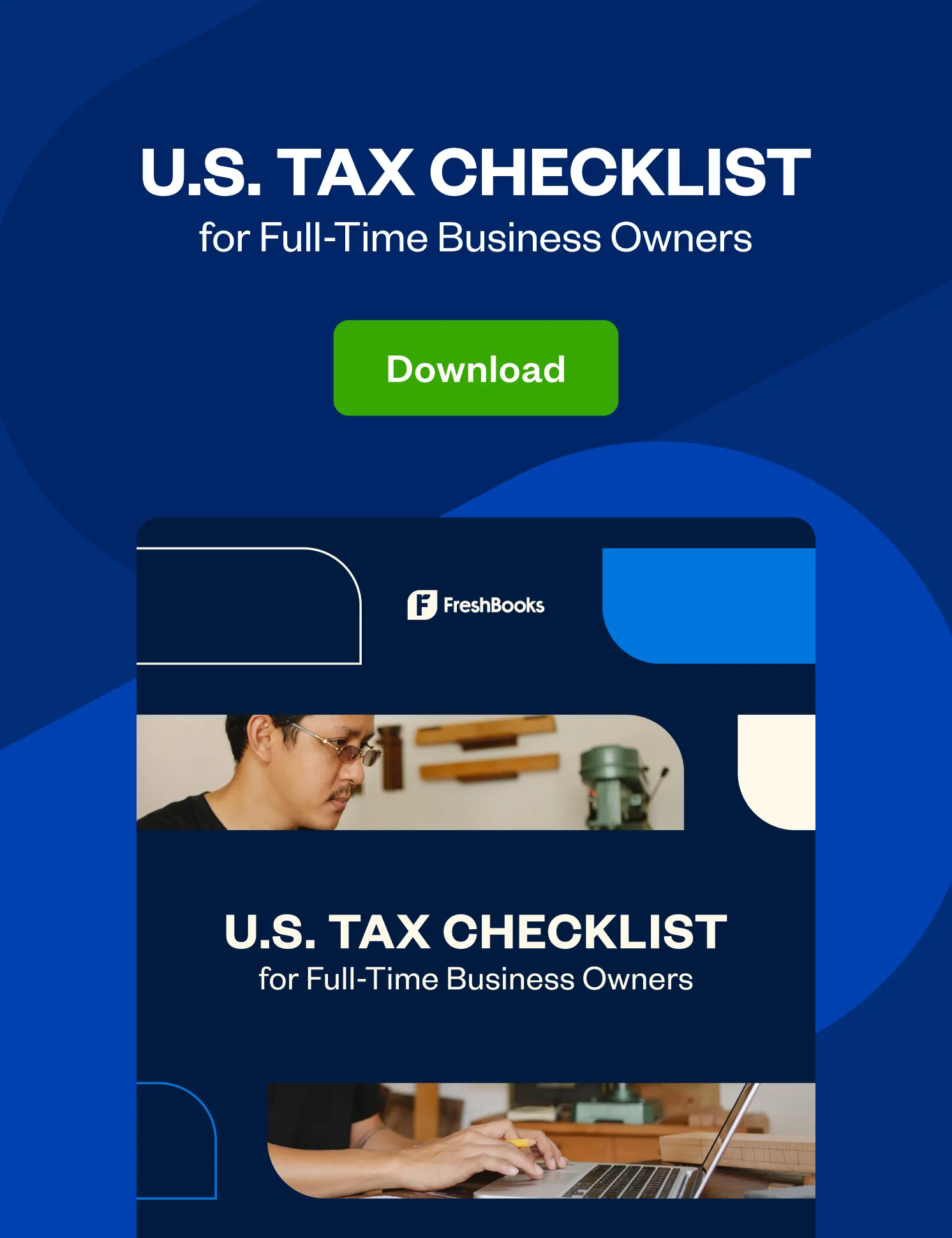The filing deadline for your federal income tax return is here. Have you filed your return yet? Learn how you can get an extension based on your business structure.

As a small business owner, you are probably pulled in a million different directions every day, let alone at tax time. And while you have the best of intentions to get your business income tax done and dusted by the tax filing deadline, sometimes you just can’t get it together in time. Maybe you’re still waiting on documents such as a K-1 from an investment, or perhaps you’ve just been too preoccupied with keeping your business on track to prepare your return.
Whatever the reason, the IRS understands the reality of running out of time and makes it easy to file a business tax extension. Check out the table below if you’re unsure when business tax returns are due for your business structure. And the deadline to file a business tax extension is the same as the business tax filing due date, so take note!
| Business Structure | Return Due Dates |
| Sole proprietorship | April 15 |
| Partnership | March 15 |
| Single-member LLC | April 15 |
| >Multi-member LLC | March 15 |
| S corporation | March 15* |
| C corporation | April 15* |
*These are the due dates for the calendar year entity (when the last day in your business year is December 31).
Keep in mind that if any of the above dates fall on a weekend or holiday, the deadline shifts to the next business day.
If you’re unsure how to file a tax extension, here’s everything you need to know to do it with confidence.
Table of Contents
Why File a Business Tax Extension?
There are a lot of reasons why your business may need to file for a tax extension. The IRS understands that not everything always goes as planned, and sometimes you just need a little extra time to get it right. Some reasons you might need an extension include:
- You need more time to file your business return accurately.
- You’re making contributions to a Simplified Employee Pension Plan (SEP) IRA and won’t have them completed by the initial tax deadline.
- Some of the tax filing documents you need are missing or incorrect, and you’re waiting to receive the correct documents.
But filing for an extension won’t help you out if you can’t make your business tax payment by the deadline. The extension is only a deadline for filing your taxes, not for paying them. You’ll need to pay any taxes due by the original deadline, or you will be charged interest and fees. All of which will affect your tax refund.
How to File for a Business Tax Extension
If that tax deadline is sneaking up on you and you think there’s a chance that you won’t be able to file your taxes by the due date, it’s time to file an extension. Here’s how to do that for each business entity type.
How to File a Tax Extension as a Sole Proprietor
Tax return: IRS Form 1040 with business Form Schedule C
Due date: April 15
The IRS makes filing for an automatic six-month extension pretty painless with Form 4868, Application for Automatic Extension of Time to File U.S. Individual Income Tax Return.
If you expect to owe money, you’ll need to estimate the amount you owe and send a check along with the form for a tax extension.
When mailing your extension and payment, make sure to send them via certified mail, so you’ll have proof that your tax extension was filed on time. The IRS processes an enormous amount of mail every day, and things do get lost. If the IRS claims it did not receive your payment or extension by the due date, you could get hit with penalties. If you can provide proof that the check or extension was mailed by the due date, it will be deemed received on the day you mailed it, even if it is actually received days later.
Filing Your Tax Extension Online
If snail mail isn’t your thing, you can e-file your business tax extension using tax preparation software or by making an estimated payment online using IRS Direct Pay. This secure service lets you pay directly from a checking or savings account for no additional fee, and you’ll get instant confirmation that your payment was submitted. Just select “Extension” under the reason for payment, and make sure you choose the correct form and tax period to let the IRS know where to apply your payment.
Making an extension payment via Direct Pay automatically extends your income tax return window. You can get an automatic extension when you make a payment with Direct Pay, the Electronic Federal Tax Payment System, or by debit or credit card. So, making a payment for your business tax extension online can provide a little wiggle room if you need it.
Calculating the estimated amount due can be a challenge if you’re not prepared to file your tax return, but your tax preparer or software may be able to help. Just provide as much information as you have, then use estimated amounts for the rest. If your tax situation has not changed much since you filed last year, that’s an excellent place to start.
And while you’re filing your federal return, don’t forget your state return. In most states, you’ll need to file for both federal and state extensions.
How to File a Tax Extension as a Partnership, Multi-Member LLC, or S Corporation
Tax return: IRS Form 1065 (partnership and multi-member LLC) and 1120 S (S corporation)
Due date: March 15
To request an extension, partnerships, limited liability companies (LLCs), and S corporations use Form 7004, Application for Automatic Extension of Time to File Certain Business Income Tax, Information, and Other Returns.
Because these entities are not taxed at the entity level on their income, you don’t need to send in an estimated tax payment with your extension Form 7004. Instead, you’ll need to also file an extension for your Form 1040 personal tax return. With that extension, you should determine the income that will flow through to your individual tax return and pay estimated tax with your individual extension.
To file an individual extension and pay your estimated tax, you will use Form 4868, Application for Automatic Extension of Time to File U.S. Individual Income Tax Return.
How to File a Tax Extension as a C Corporation
As with partnership, LLC, and S corporation tax returns, C corporations use Form 7004 to file for an extension. The extension Form 7004 can be e-filed or mailed, but if you choose not to e-file, you should send it via certified or registered mail for proof of mailing.
C corporations must pay any business tax due by the April 15 deadline, regardless of whether or not they file for an extension. Corporations must also make payments using the Electronic Federal Tax Payment System (EFTPS).
Any business can voluntarily use the EFTPS system to make federal tax deposits, but corporations are required to use EFTPS to make all federal deposits, including employment taxes, excise taxes, and corporate income taxes. You can enroll online, then make payments online or by phone. For more information on the EFTPS system, check out IRS Publication 4990, EFTPS Payment Instruction Booklet for Business and Individual Taxpayers.
Can You File Your Own Business Tax Extension?
If you haven’t found a tax preparer you like working with, or you just enjoy the DIY route, filing for a business tax extension is absolutely fine to do on your own. The IRS makes it easy to do so, giving you all of the tax forms you need right on their website.
But if you do need a little help, there are great resources to help you connect with the right professionals. If you need help organizing your books before you’re ready to file your business taxes, consider online bookkeeping services. And if you’re looking for a certified public accountant (CPA) to help file for you, our partners at Taxfyle will connect you with a licensed CPA.
Getting a State Business Tax Extension
Now that you know how to get an extension for a business tax return from the IRS, it’s important to note that this extension is only for your federal business income tax. Some states will automatically extend your state return when you file a federal extension, but some require their own form.
Ask your tax preparer, or check with your state’s Department of Revenue to see which form your state uses.
The Bottom Line
If you need to request an extension for your small business, the IRS makes it easy to do so. There are plenty of reasons why small business owners need extra time to file. Just remember that this is an extension to file business taxes, not to pay them. As always, if filing tax returns isn’t your strong suit, get tax help and tax advice from a certified tax professional.
This post was updated in January 2025.

Written by Erica Gellerman, Freelance Contributor
Posted on March 15, 2021
This article was verified by Janet Berry-Johnson, CPA and Freelance Contributor







